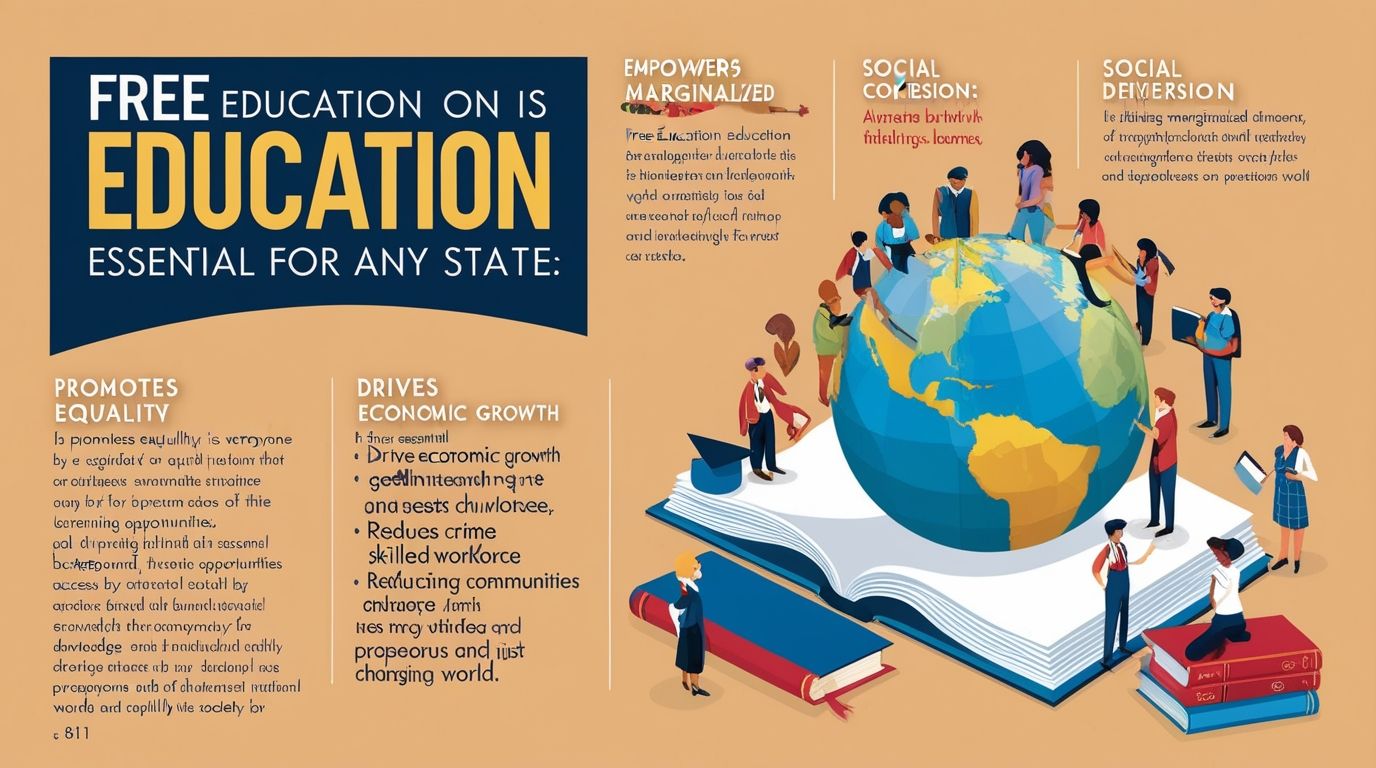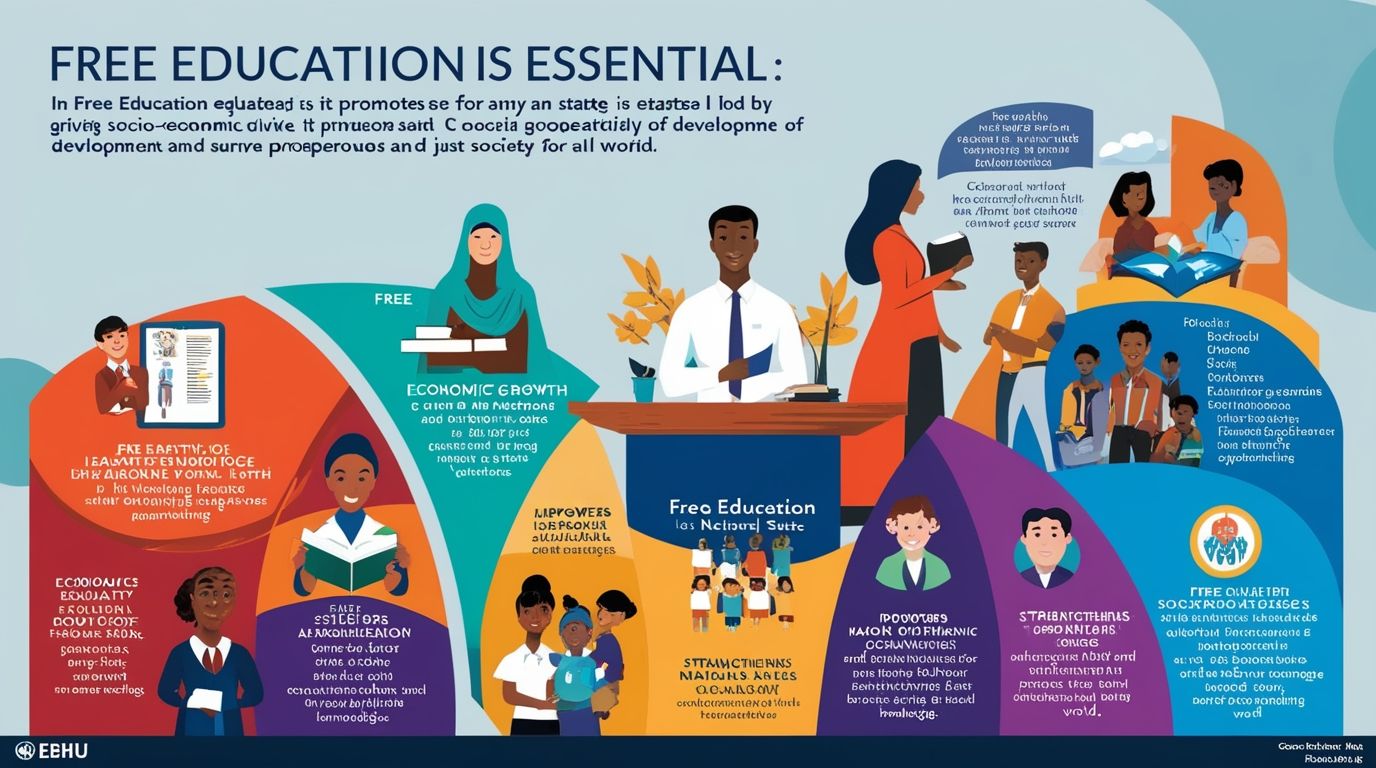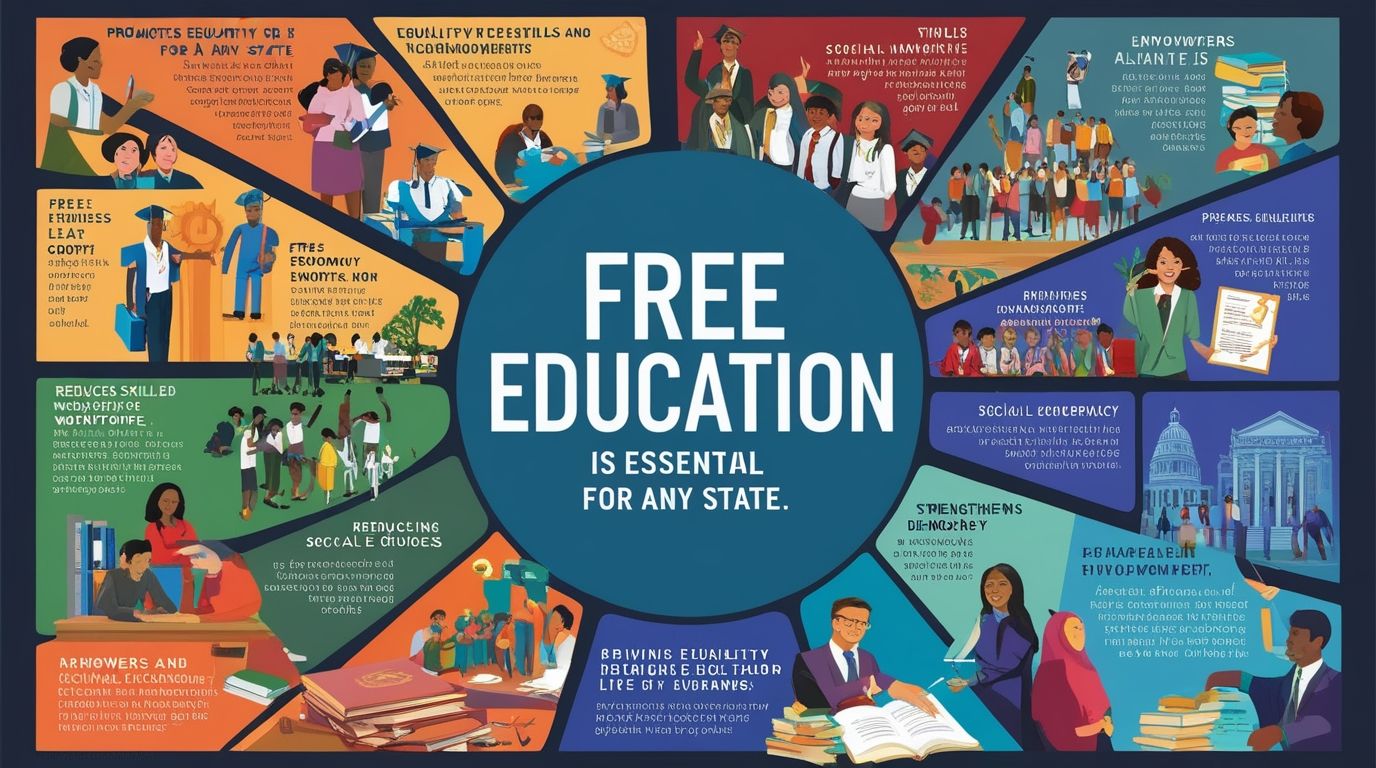Why Free Education is Important in a State Education is often referred to as the backbone of a society, shaping the future of individuals and the state as a whole. The notion of free education, particularly when provided by the state, is a powerful tool for societal transformation and economic development. This article explores why free education is crucial for any state, emphasizing its role in promoting equality, economic growth, social cohesion, and overall national development.
1. Promotion of Equality and Social Justice
Free education serves as a critical equalizer in society. In many states, there is a significant disparity between different social classes, often exacerbated by unequal access to quality education. Wealthier families can afford private schooling, which often provides better resources and opportunities, while poorer families may struggle to access even basic education. This inequality perpetuates the cycle of poverty and social stratification.
By providing free education, the state ensures that every child, regardless of their socio-economic background, has access to the same quality of education. This levels the playing field and gives every individual the chance to succeed based on their abilities and efforts, rather than their financial circumstances. In turn, this promotes social mobility, allowing individuals from disadvantaged backgrounds to improve their socio-economic status through education.

2. Economic Growth and Development
Education is a key driver of economic growth. An educated workforce is more productive, innovative, and capable of contributing to various sectors of the economy. When a state invests in free education, it is essentially investing in its future economic prosperity. Educated individuals are better equipped to take on skilled jobs, start businesses, and adapt to changing economic conditions.
Moreover, education leads to a more informed and capable citizenry, which is crucial for the development of industries, technology, and services. Countries with higher levels of education tend to have more robust economies, with higher levels of GDP and lower unemployment rates. Free education, therefore, is not just a social good but also an economic necessity for states aiming to compete in the global market.
3. Reduction of Crime and Social Issues
There is a strong correlation between education levels and crime rates. Individuals who receive a good education are less likely to engage in criminal activities. This is partly because education opens up more opportunities for lawful employment, reducing the need for individuals to resort to crime to survive. Additionally, education fosters critical thinking, empathy, and a better understanding of societal norms, which contribute to law-abiding behavior.
By providing free education, states can reduce the incidence of crime and other social issues. This not only creates a safer society but also reduces the costs associated with law enforcement, the judicial system, and incarceration. The resources saved can then be redirected to other critical areas such as healthcare, infrastructure, and further educational improvements.
4. Fostering Social Cohesion and National Unity
Education plays a crucial role in shaping the values, beliefs, and attitudes of individuals. A free and inclusive education system can promote social cohesion by teaching students about the importance of diversity, tolerance, and respect for others. It also helps to instill a sense of national identity and shared purpose, which is essential for maintaining unity in a diverse state.
In many states, education is a key tool for integrating different cultural, ethnic, and religious groups into a cohesive society. By providing free education to all, the state can ensure that all citizens, regardless of their background, are exposed to a common curriculum that promotes mutual understanding and respect. This is particularly important in states with diverse populations, where education can be a unifying force that helps to prevent social fragmentation and conflict.
5. Improving Public Health and Well-being
Education is closely linked to public health outcomes. Educated individuals are more likely to make informed decisions about their health, leading to better overall health outcomes. For instance, education is associated with lower rates of smoking, obesity, and substance abuse. Educated individuals are also more likely to seek medical care when needed and to adhere to prescribed treatments.
Free education, particularly when it includes comprehensive health education, can therefore play a significant role in improving public health. This not only enhances the quality of life for individuals but also reduces the burden on the state’s healthcare system. Healthier populations are also more productive, further contributing to economic growth and stability.
6. Empowerment of Marginalized Groups
In many societies, certain groups, such as women, ethnic minorities, and people with disabilities, have historically been marginalized and denied equal opportunities, including access to education. Free education is a powerful tool for empowering these groups and ensuring that they have the same opportunities as others to succeed in life.
For instance, educating girls has been shown to have a wide range of positive effects, including delayed marriage and childbearing, reduced infant and maternal mortality, and improved economic outcomes for families and communities. Similarly, providing free education to people with disabilities ensures that they have the skills and knowledge needed to participate fully in society and the economy.
By ensuring that all citizens have access to free education, states can help to break down the barriers that have historically held these groups back, leading to a more inclusive and equitable society.

7. Strengthening Democracy and Civic Engagement
Education is fundamental to a functioning democracy. An educated populace is more likely to participate in the democratic process, whether by voting, engaging in public debate, or holding public office. Education fosters critical thinking and a better understanding of political systems, which are essential for making informed decisions in the voting booth.
Free education ensures that all citizens, regardless of their background, have the knowledge and skills needed to participate fully in the democratic process. This is particularly important in states with a history of disenfranchisement or political instability. By investing in free education, states can strengthen their democratic institutions and ensure that all citizens have a voice in the decisions that affect their lives.
8. Adapting to Technological Advancements
The world is rapidly changing, with technological advancements transforming industries, economies, and societies. To keep up with these changes, states need a workforce that is not only educated but also capable of lifelong learning. Free education lays the foundation for this by ensuring that all citizens have access to the knowledge and skills they need to adapt to new technologies and changing economic conditions.
In particular, free access to education in science, technology, engineering, and mathematics (STEM) is crucial for states looking to compete in the global economy. By investing in free education, states can develop a workforce that is capable of driving innovation and technological advancement, which are key to economic growth and national competitiveness.
9. Global Competitiveness and Innovation
In an increasingly globalized world, education is a key factor in determining a state’s competitiveness on the international stage. States that invest in free education are more likely to produce a skilled workforce capable of driving innovation and attracting foreign investment. This is particularly important in high-tech industries, where a well-educated workforce is essential for maintaining a competitive edge.
Moreover, free education can help states to attract and retain talent, both from within and outside their borders. By providing high-quality education at no cost, states can position themselves as leaders in innovation and technology, attracting businesses and individuals looking to capitalize on these opportunities.
10. Moral and Ethical Responsibility
Finally, providing free education is a moral and ethical responsibility for any state that values the well-being of its citizens. Education is a basic human right, as recognized by various international agreements and declarations. By providing free education, states fulfill their obligation to ensure that all citizens have the opportunity to develop their full potential and contribute to society.
Moreover, free education is a reflection of a state’s commitment to the principles of equality, justice, and social welfare. It demonstrates a recognition of the intrinsic value of every individual and a commitment to ensuring that all citizens have the opportunity to succeed.
Conclusion
Free education is not just a policy choice; it is a necessity for any state that aspires to be just, prosperous, and inclusive. By providing free education, states can promote equality, drive economic growth, reduce crime, foster social cohesion, improve public health, empower marginalized groups, strengthen democracy, adapt to technological advancements, enhance global competitiveness, and fulfill their moral and ethical responsibilities. In short, free education is essential for the overall development and well-being of both individuals and the state as a whole.

8 thoughts on “Why Free Education is Important in a State”
Comments are closed.